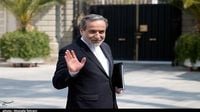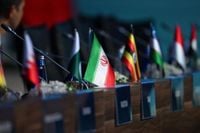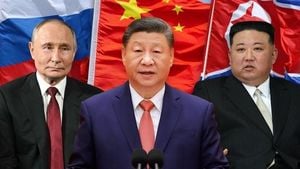For the first time since the dramatic escalation of military conflict between Iran, Israel, and the United States in June 2025, United Nations nuclear inspectors have returned to Iranian soil. But while their presence at the Bushehr nuclear power plant marks a tentative step forward, the path to restoring full international oversight—and averting the reimposition of sweeping United Nations sanctions—remains fraught with uncertainty and diplomatic brinkmanship, according to multiple international sources including France 24, Nuclear Engineering International, and the Financial Times.
Rafael Grossi, director general of the International Atomic Energy Agency (IAEA), struck a cautiously optimistic tone in public remarks on August 28, 2025. "I can say that it is important that the inspectors are back," Grossi told reporters in Washington, where he met with U.S. Secretary of State Marco Rubio and European counterparts. "At the same time, we still need to clarify a number of things, and we still need to address all the issues that are important in terms of the inspections that we have to carry out in Iran."
The return of IAEA inspectors comes after a two-month standoff. In June, following Israeli airstrikes on Iranian nuclear and military facilities—strikes that killed more than 1,000 people, according to Iranian reports—and subsequent U.S. attacks on Fordo, Isfahan, and Natanz, Tehran suspended all cooperation with the agency. The Iranian parliament swiftly passed legislation requiring that all cooperation with the IAEA be subject to approval by the country’s Supreme National Security Council. Iran cited the IAEA’s failure to condemn the attacks as justification for its withdrawal from the monitoring regime.
It was only after weeks of high-level negotiations and mounting international pressure that Iran agreed to allow inspectors back into the Bushehr facility in southwestern Iran. Iranian Foreign Minister Abbas Araghchi confirmed on August 27 that the inspectors’ mandate was limited: "No final text has yet been approved on the new cooperation framework with the IAEA and views are being exchanged," he said, as quoted by state television. He emphasized to parliament that the inspectors were present solely to oversee a scheduled fuel replacement at Bushehr, and that any further cooperation would strictly adhere to Iranian law.
Inspectors have not been allowed to return to other key sites, including Fordo and Natanz, which were targeted in the June attacks. Grossi acknowledged this limitation, stating, "We are continuing the conversation so that we can go to all places, including the facilities that have been impacted." He added pointedly, "There is no such thing as a la carte inspection work." The IAEA, he argued, cannot be restricted to non-attacked facilities alone.
According to Nuclear Engineering International, the IAEA’s deputy head, Massimo Aparo, visited Tehran on August 11 to discuss a new framework for cooperation, followed by further talks in Vienna. Yet, as of late August, no formal agreement has been reached. Parliament Speaker Mohammad Bagher Ghalibaf assured lawmakers that the legal framework for cooperation was being observed, even as some MPs voiced concerns that the return of inspectors violated national sovereignty and lacked transparency. Lawmaker Mohammad Taghi Naghdali underscored that any cooperation with the IAEA should only proceed if Iran’s territorial integrity and the safety of its nuclear scientists are fully guaranteed—a sentiment echoed by many in the Iranian parliament.
Meanwhile, the diplomatic clock is ticking. The so-called E3—Britain, France, and Germany—have repeatedly warned Iran that unless it resumes full cooperation with the IAEA, transparently accounts for over 400 kilogrammes of highly enriched uranium, and engages credibly in diplomacy with Washington, they will trigger the United Nations "snapback mechanism". This would reimpose sanctions lifted under the 2015 Joint Comprehensive Plan of Action (JCPOA), a deal painstakingly negotiated between Iran and the world’s major powers.
The E3 and the United States set an August 31 deadline for Iran to meet these conditions. If unmet, the E3 plans to invoke the snapback mechanism, a move that could have far-reaching economic and political consequences for Iran. The snapback provision, which remains in force until October 18, 2025, is seen by many as the last major lever the West holds over Tehran’s nuclear ambitions.
Iran, for its part, has signaled that triggering the snapback would have dire consequences for international diplomacy. Deputy Foreign Minister Karim Gharibabadi warned that if sanctions are reimposed, "the path of interaction that we have now opened with the International Atomic Energy Agency will also be completely affected and will probably stop." Some Iranian officials have gone further, threatening to withdraw from the Nuclear Non-Proliferation Treaty altogether if UN sanctions return.
As the August deadline loomed, Russia entered the fray in an effort to buy more time for diplomacy. On August 27, Russia circulated a draft United Nations Security Council resolution proposing a six-month extension of the snapback deadline to April 18, 2026. Russia’s deputy UN ambassador, Dmitry Polyanskiy, described the proposal as a "litmus test for those who really want to uphold diplomatic efforts, and for those who don't want any diplomatic solution, but just want to pursue their own nationalist, selfish agendas against Iran." China, another party to the JCPOA, has also expressed support for extending talks and avoiding further escalation.
Despite these efforts, the latest round of talks in Geneva between Iran and the E3 ended inconclusively. Both sides continue to insist that they are committed to diplomacy, but the gulf between their positions remains wide. Iran refuses direct talks with the United States and remains wary of European coordination with Washington. The E3, for their part, have made clear that sanction relief is contingent on verifiable Iranian compliance—something that, as of now, remains elusive.
Behnam Taleblu, a senior director at the Washington-based Foundation for Defense of Democracies, summed up the prevailing skepticism in an interview with RFE/RL: "The only way that [a delay in snapback sanctions] could happen is if inspectors can fully resume monitoring and if there’s real political will in Tehran for diplomacy. In that case, sanctions could be postponed for three to six months…. But I see that as highly unlikely."
The stakes could hardly be higher. On the one hand, a return to full IAEA monitoring and a diplomatic breakthrough could stave off renewed sanctions and open the door to a broader rapprochement between Iran and the West. On the other, a collapse in talks and the reimposition of sanctions could trigger a new cycle of escalation—one that might further destabilize a region already on edge.
For now, the world waits to see whether the cautious steps taken in Bushehr will lead to a wider thaw, or whether the window for diplomacy is closing for good.





